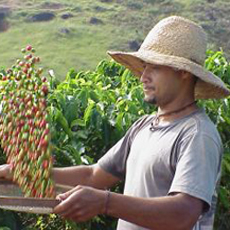OverviewWhile this is an article about organic coffee, not about social reform, it’s hard to write about one without the other. When you talk about organic milk, it means that the cows enjoy better living conditions. When you talk about organic coffee, it means that entire villages of people are able to rise from acute poverty to a living wage...that they have health care and education for their children. So if you just want to read the coffee reviews, skip to the organic coffee product reviews. If you want an earful about the social movement behind organic coffee, start here. For most coffee drinkers, having a morning cup of java every day is so routine that it’s easy to forget the beans you choose affect the lives of coffee growers and workers all across the developing world. According to industry statistics, for every pound of coffee sold in the United States, which is typically priced for retail between five and nine dollars, the average coffee farmer receives less than thirty-five cents and pickers receive less than fourteen cents. The price disparity for coffee sold ready-to-drink at restaurants and coffee shops is even greater. A crop of beans sold in the United States that will be sold by the brewed cup is estimated to be worth about $750,000. From that small fortune, the small farmers and the field pickers who work for large concerns don’t earn enough to scrape by; the majority live in a cycle of poverty that most people enjoying a $4 latte will never know about.
Go To Page 2: Fair Trade-Certified Return To The Article Index Above
Recent Articles From Our NutriNibbles™ News Feed:Subscribing notifies you whenever
there are
Lifestyle Direct, Inc. All rights reserved. Images are the copyright of their respective owners.
|

The Nibble Blog
The Latest Products, Recipes & Trends In Specialty Foods
The gourmet guide you’ve been waiting for. New food adventures are served up daily. Check it out!

Food Glossary
Our Food Directories Are "Crash Courses" In Tasty Topics
Your ultimate food lover’s dictionary packed full of information and historical references. Take a look!

